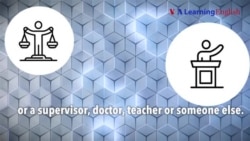Today, we begin the program with a short listening exercise. Pay attention for two verbs connected to giving advice:
If you are like me, you may not have had a real haircut since the pandemic began. But a friend just recommended a hair salon on 17th Street. She also suggested I call for an appointment at least one month before the desired date.
Did you catch the two verbs related to advice-giving? They are “recommend” and “suggest.”
In English, there are several verbs that carry the meaning of advice. On today’s program, we will talk about three of them. The verbs “advise,” “suggest” and “recommend” are close in meaning but there are some differences. However, these verbs share a few sentence patterns.
Meanings and uses
Let me begin by talking about differences between the meanings and uses.
The verb “advise” is the most formal of the three and is usually used when someone with authority or expertise gives a strong suggestion. It could come from a government official, for example, or a work supervisor, a doctor or someone else. Its noun form -- “advice” -- does not carry the same usage rule. Anyone can offer advice to anyone else.
The verb “recommend” is less formal than “advise” and more personal. It is usually used when someone is making a suggestion based on his or her personal experience. Friends, family and coworkers, for example, often recommend things to each other. Even a friendly stranger can recommend something based on experience.
“Suggest” is the least formal of the three verbs. We use this verb in many situations to offer an idea, opinion or possible plan of action for someone to consider.
Note that, in common, everyday English, the verbs “suggest” and “recommend” are sometimes used interchangeably.
A very quick test
Now, let’s do a quick self-test to see how much we know about sentence patterns. I will give you three sentences. You decide which ones use correct grammar. Here they are:
- My dad suggested that I speak with my doctor.
- She recommended to me a documentary film.
- The teacher advised you should study more.
Did you decide which sentences are correct? The only correct answer is: “My dad suggested that I speak with my doctor.”
If you are unclear about why it’s correct, do not worry. Even highly experienced English learners can find the patterns tricky.
Many sentence patterns
Now, let’s jump into the grammar.
The verbs “advise” “suggest” and “recommend” can follow many sentence patterns. Today, we will focus on a few patterns they have in common. Each verb can be followed by:
- a noun phrase
- a that-clause
- or a gerund
Verb + noun phrase
The first pattern is verb + noun phrase. A noun phrase is a group of words in a sentence that act as a subject or object. Noun phrases that follow the verbs “advise” “recommend” and “suggest” act as sentence objects.
Listen to an example to find out what I mean. Pay attention to the verb and the noun phrase that follows:
My doctor advises 30 minutes of cardio per day.
Here, the noun phrase after “advises” is “30 minutes of cardio.”
Can you recommend a good restaurant in town?
Did you find the noun phrase after “recommend”? It is “a good restaurant.”
May I suggest this natural pet food?
Did you catch the noun phrase? It is “this natural pet food.”
Sometimes, we want to name the person who receives the suggestion. When we do this, we often follow the noun phrase with to + person. Listen to an example, which corrects a sentence from the short test earlier.
She recommended a documentary film to me.
The noun phrase here is “a documentary film.” Notice that “to me” comes after (not before) the noun phrase to show who received the suggestion.
Verb + that-clause
The verbs “advise,” “suggest” and “recommend” can also be followed by that- clauses. A clause is a part of a sentence with its own subject and verb. That-clauses begin with the word “that” and are noun clauses.
Listen to some examples. Notice that each of our verbs of advice is followed by a that-clause:
Toni suggests that we hit the road by 6 in the morning.
Our boss advised that the team finish the project before the holiday.
I recommend that you bring warmer clothing. It can get really cold there at night.
There are two things to know about using that-clauses with these verbs:
The first is that the basic form of the verb must be used in the that-clause. The basic forms in the examples are “hit,” “finish” and “bring.”
The second is we can leave out the word "that” in noun clauses, especially in everyday speech and writing. For example, there is no difference in meaning between “I recommend that you bring warmer clothing” and “I recommend you bring warmer clothing.”
Verb + gerund
And finally, the verbs “advise,” “suggest” and “recommend” can be followed by gerunds.
Some of you may remember that a gerund is the -ing form of a verb and acts as a noun. Listen to these examples and notice that each verb is followed by a gerund:
I suggest taking a walk after lunch.
Our lawyers advised against speaking to the media.
We recommend going to the park on weekdays.
Did you find the gerunds? They are “taking,” “speaking” and “going.” Notice that we use the preposition “against” when we are expressing a negative meaning of “advise.”
Well, that’s our program for today. I recommend that you come back next week for another grammar lesson!
I’m Alice Bryant.
Alice Bryant wrote this story for VOA Learning English. Mario Ritter, Jr. was the editor.
_______________________________________________________________
A Common Mistake
Some English learners and native English speakers make the common mistake of using modal verbs, such as "should," after today's verbs. A person may say or write, for example, “The teacher advised you should study more.” Use of the modal verb “should” here makes the wording redundant. The verb “advise” already expresses that someone should do something. This redundancy is sometimes acceptable in British English. But do not use it in American English.
________________________________________________________________
Words in This Story
salon –n. a business that gives people treatments to improve their appearance
pattern –n. a repeated design or structure that can be identified
formal –adj. language that is for serious or official speech
authority –n. the power or influence to give directions
focus –n. the main purpose or interest
cardio –n. exercises that raise your heart and breathing rates
pet –n. an animal such as a dog or cat that people keep mainly for pleasure
boss–n. the person whose job is to tell other workers what to do
negative –adj. expressing no, not approving
redundant –adj. something repeated that is not necessary






